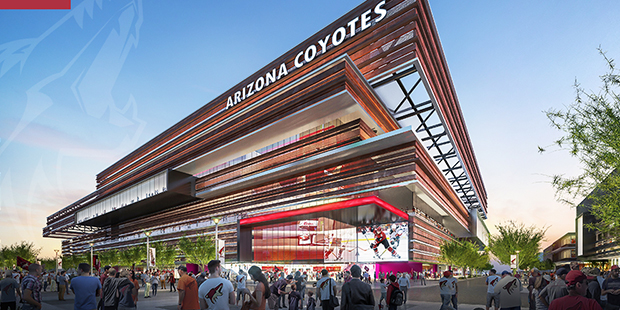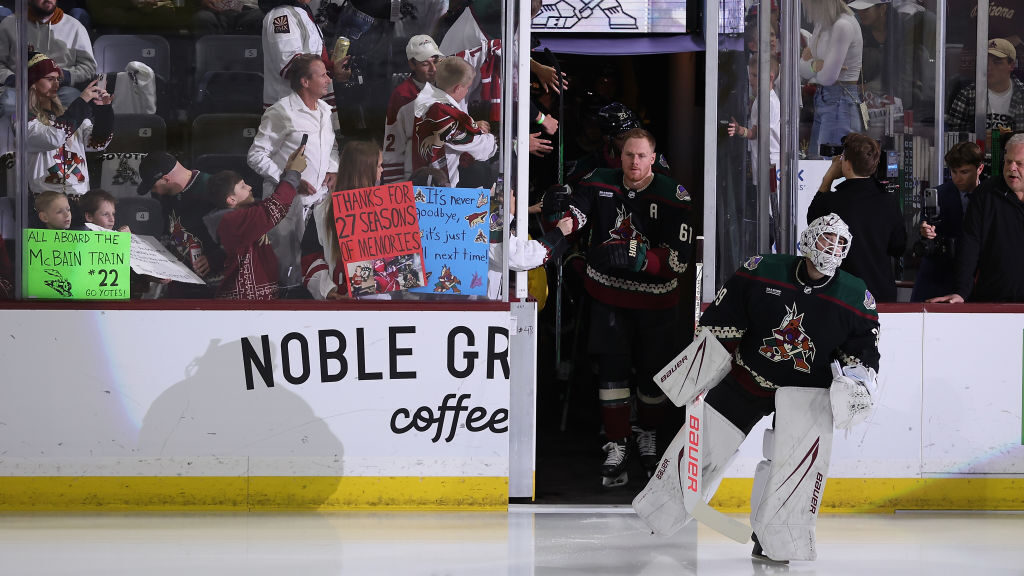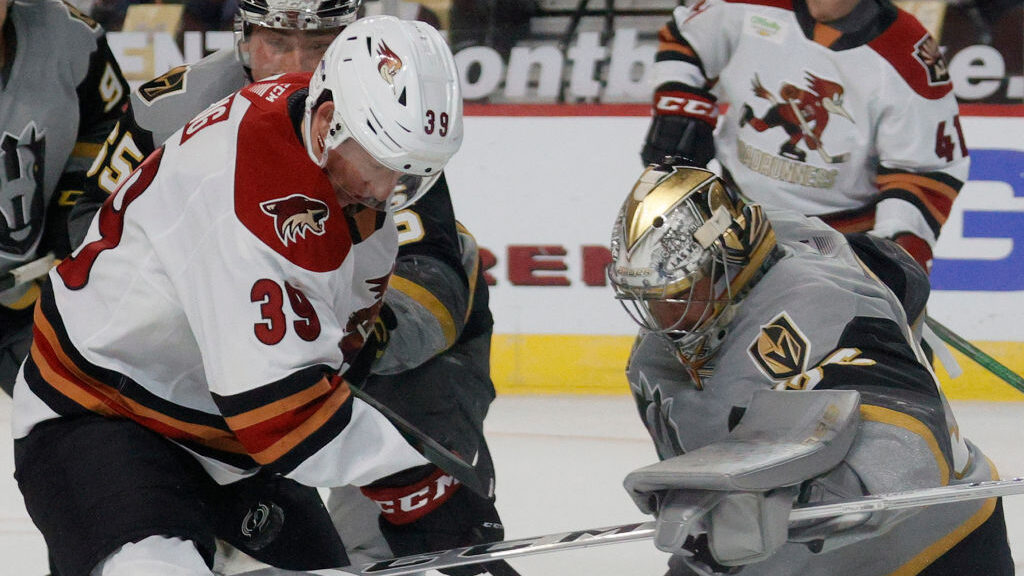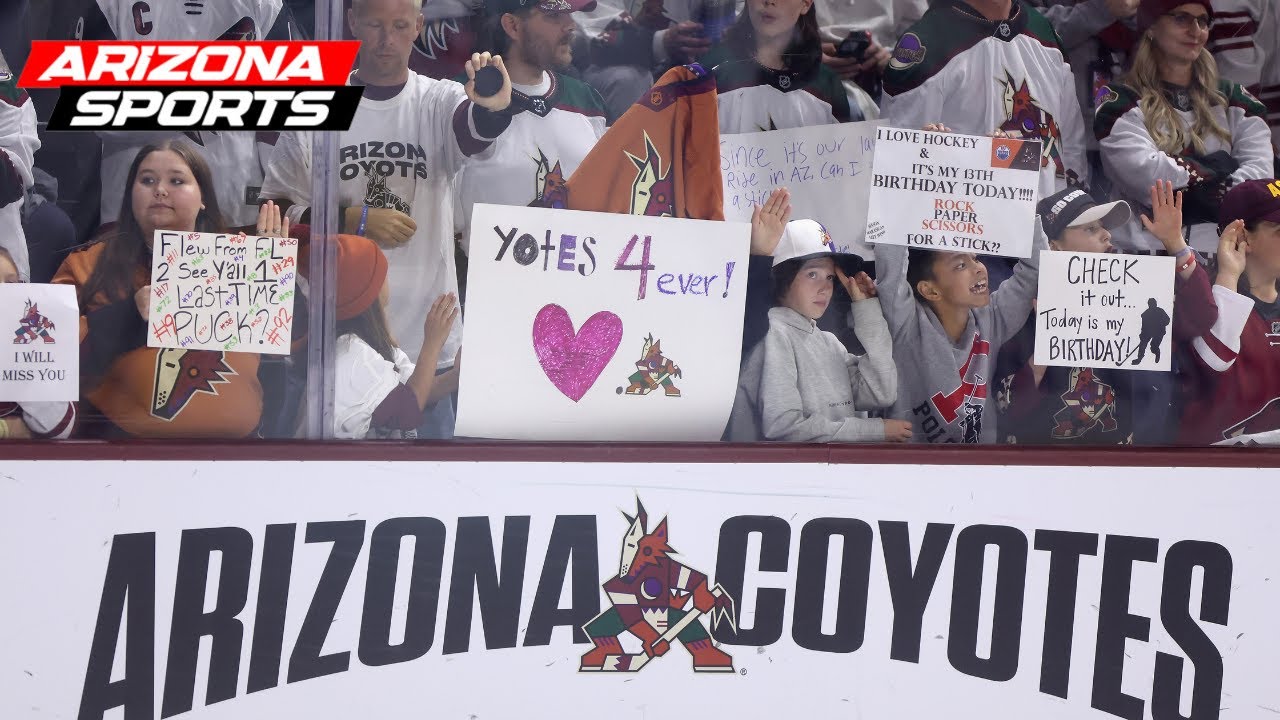Coyotes, ASU take first step in possible construction of arena
Nov 14, 2016, 10:55 AM | Updated: 5:57 pm

An artist's rendering of the Arizona Coyotes' possible new arena in Tempe, Arizona. (Arizona Coyotes Photo)
(Arizona Coyotes Photo)
The Coyotes and Arizona State University are taking the first step in the possible construction of a 16,000-plus seat arena at the northwest corner of McClintock Drive and Rio Salado Parkway on Karsten Golf Course.
Both sides announced that the Coyotes have entered into an exclusive negotiation agreement with Catellus Development Corp., ASU’s athletic facilities district developer, to work towards the finalization of a new arena and commercial development project within the 330-acre district along Tempe Town Lake. The team would have until June 30, 2017 to review the land and get the political, development, architectural and financial plans required to build it in order.
Sources stressed that this is not an agreement to build an arena on the site. That would only come after the Coyotes have shown they have met all the requirements to go ahead with the project, but all sides expressed optimism that those goals can be achieved.
“I’m very pleased with where they are,” NHL deputy commissioner Bill Daly said. “I think this is an incredible opportunity for an exciting new future in the Valley.”
“As the first major partner for the ASU Athletic Facilities District, the Coyotes campus will generate momentum for this innovative, urban corridor,” said Greg Weaver, Executive Vice President for Catellus Development Corporation, in a release. “We are excited to partner with the Coyotes for their new facility.”
“We are thrilled to partner with Catellus on this tremendous project that will include our future new home in the East Valley,” Coyotes Majority Owner, Chairman and Governor Andrew Barroway said. “The Coyotes are committed to Arizona, and we are extremely excited about our bright future.”
“Today’s a very exciting day for the organization,” Coyotes president and CEO Anthony LeBlanc added. “To get to the point where we are putting out this joint announcement illustrates that we have done an awful lot of work, but the reality is there’s still a lot of work to be done.”
It’s no secret that the two sides have been working together on a potential partnership, but talks heated up in the last six months. While multiple media outlets reported another site on the north side of the 202 Freeway was the choice, the Karsten site has been the focal point of discussion for more than a year and meshes well with the university’s plans for an athletic district on the east side of Rural Road where the Weatherup Center (basketball), soccer and softball facilities already reside, and where the school would like to relocate the Whiteman Tennis Center with the re-launch of the men’s tennis program and the Intercollegiate Tennis Association’s relocation of its headquarters to Tempe.
The plans for that district go well beyond athletic facilities, however, and could include retail options, mixed-use office space and a hotel in a development that comprises 58 acres.
“This actually all started with a conversation between myself and (ASU Vice President for University Athletics) Ray Anderson in August of 2016,” LeBlanc said. “The City of Glendale had just finalized their plans to go forward with a two-year agreement with the Coyotes and have the ability to bring in a new arena manager.
“That’s when we realized it was time to start exploring what the other opportunities looked like. Ray and I had already been talking about their need for a new hockey facility, but we got on the phone and we said, ‘why don’t we look at something bigger?’ To get from that point to where we are has been an exhaustive process.”
Preliminary plans call for a main arena of 16,000-plus seats with an adjacent, 4,000-seat arena where Arizona State’s Division I hockey program would play its games. Barroway said the facility would be “first rate. We don’t think we will compromise in any way.”
Other ASU programs such as wrestling and gymnastics could use the smaller facility, which would also be used for youth hockey and other community events. The hope is that construction could be completed in time for the 2019-20 NHL season.
At a press conference Monday, LeBlanc said the cost would be in the $400 million range and that the team expects to be responsible for half of it. The other half would have to come from a public-private partnership that could come in the form of a credit line from the City of Tempe and some sort of transaction privilege tax generated within the district that would require State Legislature approval.
“There will be several tranches of money that will be utilized to build the arena of which the Coyotes will be the largest tranche,” he said. “The Coyotes will be the lead investor in this facility and ASU also has a financial commitment toward the project.
“We’re not looking for general funds from any governmental organization, but we need to form a very strong partnership with the State of Arizona and the City of Tempe. We also have to work with a variety of stakeholder groups such as Goldwater Institute and others so they understand what it is we’re trying to do. These projects have a process.”
ArizonaSports.com reported in October that private developers, in cooperation with the Salt River Pima-Maricopa Indian Community, are also exploring the idea of building a 20,000-seat multi-purpose event center south of the Scottsdale Pavilions and west of the 101 Freeway that they say could potentially house the Coyotes or Phoenix Suns, but LeBlanc told Arizona Sports, “throughout this process we have had a number of groups solicit our involvement. This particular group and site are not one with which the Coyotes are working.”
The Coyotes’ arena lease agreement at Gila River Arena in Glendale expires after this season. The team has an option to extend that agreement and LeBlanc said discussion on that would likely resume this week, but the ownership group has made it clear it would like to relocate to the East Valley.
ASU launched a Division I hockey program last season and needs a legitimate arena to call home — or at least the promise of one — as it looks to secure conference affiliation and land top-end recruits. ASU currently plays and practices at Oceanside Ice Arena in Tempe, but it plays some of its marquee games at Gila River Arena through a growing partnership with the Coyotes.
NHL commissioner Gary Bettman was in the Valley in March to tour potential arena sites, and sources confirmed that he met with officials from ASU, officials from the City of Phoenix, including Mayor Greg Stanton, and he also toured the Pavilions site.
LeBlanc said the hope is that shovels will be in the ground by the summer of 2017, but he added that Coyotes fans should not expect any more updates before the end of the season.
“It’s good news. It’s early. A lot of us have been through a lot of this before,” Coyotes coach Dave Tippett said. “Hopefully, everything turns out as wonderful as it sounds.”






